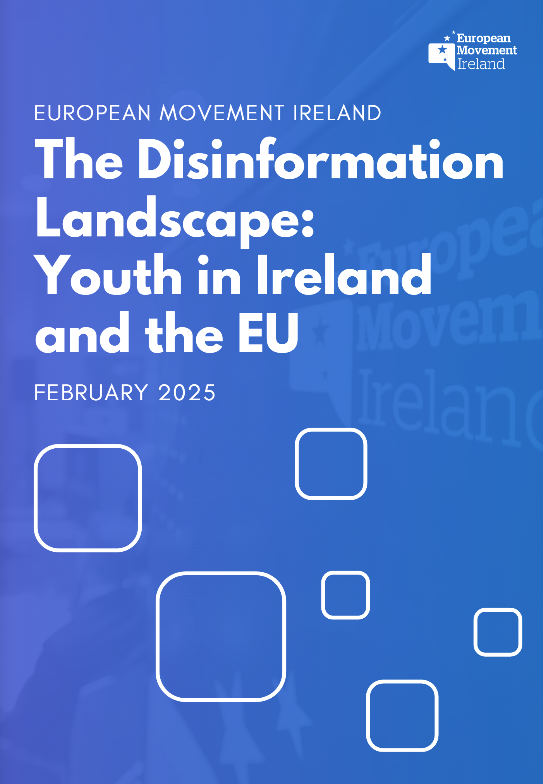by Dr Gillian Kennedy, Policy and Research Manager, European Movement Ireland
As part of an ongoing project supported by the Department of Foreign Affairs, European Movement Ireland monitors misinformation/disinformation in relation to Irish–EU affairs. Our most recent report, The Disinformation Landscape: Youth in Ireland and the EU, was written in the context of an increase in far-right attacks on refugees and migrants around Ireland, alongside the worrying and persistent display of disinformation across EU members states.
According to a recent study conducted by UNESCO and Ipsos, 68% of EU citizens believe they have encountered disinformation and fake news, with that figure rising to 80% in some countries, specifically Hungary, Bulgaria and Estonia. The same survey highlighted how Europe’s youth are disproportionately affected, with people aged 15–24 significantly more likely than older people to feel they have been exposed to disinformation. In Ireland, the Digital News Report 2024 found that 64% of the Irish public is concerned about what is real and what is fake online, compared to 50% in the rest of Europe.
In this context, we found a transnational network of far-right youth-focused groups have emerged. Our report looked at Irish, French and German ‘Active Club’ networks. These decentralised groups spread disinformation narratives regarding migration, people of colour and Irish history. One of the main youth networks in Ireland, which emerged in 2023 and that disseminates disinformation on a regular basis, is Comhaltas na nGaedheal (Brotherhood of the Irish). Comhaltas na nGaedheal is Ireland’s Active Club chapter, and has a presence on X, Substack, Telegram and previously Facebook (account now removed). In France and Germany there are approximately 32 Active Clubs, spreading from the cities of Paris and Berlin, and across rural heartlands.
The main focus of Active Clubs is street fighting. Many of the group’s posts online emphasise that young men should be ‘clean living’. There is an overt focus on going to the gym and abstaining from alcohol and processed foods in order to be fitter and stronger for fighting. There is also an emphasis on the involvement of men over women, with men expected to be the leaders and physical protectors of their family unit. Women appear only in relation to being homemakers. There is also an explicit rejection of LGBTQ+ individuals who are deemed to be reflective of ‘evils’ of contemporary progressive society.
To counter disinformation, civil society organisations in Ireland, France and Germany have been working with young people in communities to address these issues. In France, the civil society response to disinformation is focused on education, with awareness-raising activities seeking to address disinformation and emotional manipulation, for example a Civic Fab initiative called ‘What the Fake’. In Germany, the approach is significantly different, with young adults actively encouraged to report hate speech online, for example, REspect!, which is an anonymous reporting portal. Irish youth projects offer a bespoke counter-narrative approach to disinformation. For example, the Poppintree Youth Project in Ballymun, Dublin, identified the ‘kitchen sink cup of tea’ as a principal strategy to counter disinformation, by asking questions to get young people to critically think about their sources of information online.
On the EU level, much of the focus on disinformation has been on legislation. The EU’s 2022 Code of Practice on Disinformation is the cornerstone of the EU’s strategy against disinformation. However, it is a voluntary framework to which relevant organisations and industries have signed up in order to combat disinformation, as part of a broader regulatory framework in the Digital Service Act. Unfortunately, while local organisations and EU initiatives exist, ultimately, as a society, we need a wider holistic response.
Conclusively, the European Network Against Racism noted that disinformation has been successful because it builds on long-standing concepts and deeply embedded ideas. Without challenging the underlying foundations of racist ideas, disinformation will continue to be effective.
